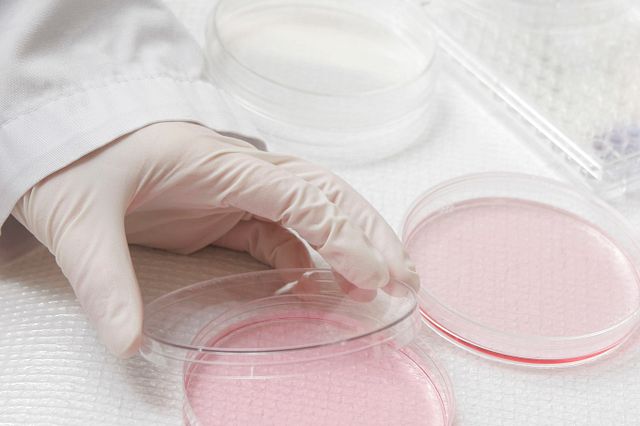ASTM F2063 Biocompatibility Testing of Nitinol Implants
The ASTM F2063 standard is a critical requirement for manufacturers and developers of nitinol implants, as it sets out the procedures to ensure that these materials are biocompatible. Nitinol (nickel-titanium) alloys have gained significant attention due to their unique properties, including shape memory and superelasticity, which make them ideal candidates for medical devices such as stents, orthodontic wires, and other implantable components.
The testing procedure outlined in ASTM F2063 aims to evaluate the potential adverse effects of nitinol implants on biological systems. This includes assessing the material's ability to interact safely with surrounding tissues without causing inflammation or other harmful reactions. The test involves several steps that simulate real-world conditions, ensuring that any potential risks are identified at an early stage of product development.
The first step in ASTM F2063 testing is specimen preparation. This process requires precision and care to ensure accurate results. The specimens must be prepared according to strict protocols defined by the standard, which may involve cutting, polishing, or coating depending on the specific type of nitinol implant being tested.
The next step involves submerging the prepared specimens in a simulated body fluid solution for a specified duration. This simulates the environment that the implant will encounter once it is implanted into the human body. During this period, the specimen's interaction with the fluid is monitored to assess any changes or reactions that could indicate potential biocompatibility issues.
Following exposure to the simulated body fluid, the specimens are subjected to further analysis using various techniques such as chemical analyses and microscopic examinations. These tests help determine whether there has been any leaching of nickel or other elements from the nitinol alloy into the surrounding tissues. Additionally, mechanical testing may be conducted to evaluate how well the material maintains its structural integrity under stress conditions similar to those encountered during implantation.
The results obtained from these tests are then compared against established criteria outlined in ASTM F2063. Compliance with these standards ensures that manufacturers can confidently market their nitinol implants as safe and effective medical devices without causing harm to patients. Proper biocompatibility testing not only protects the health of individuals but also enhances trust among healthcare providers who rely on accurate test results when recommending or prescribing treatments involving such materials.
Given the complexity involved in ASTM F2063 testing, it is essential for labs specializing in this area to possess state-of-the-art facilities equipped with advanced instrumentation capable of performing precise measurements. Our laboratory adheres strictly to all relevant guidelines and maintains ISO 17025 accreditation, ensuring reliability and accuracy throughout every stage of the testing process.
Scope and Methodology
The ASTM F2063 standard specifies procedures for determining whether nitinol implants are biocompatible with human tissue. The scope encompasses all aspects necessary to conduct comprehensive biocompatibility evaluations, including preparation of the test specimens, immersion in simulated body fluids, extraction analysis, and evaluation against predefined criteria.
- Preparation: Specimens must be prepared according to detailed specifications provided within ASTM F2063.
- Immersion: Samples are placed in a solution designed to mimic physiological conditions found at implant sites.
- Extraction Analysis: After immersion, any released elements from the nitinol alloy need to be quantified through appropriate analytical methods.
- Evaluation: Results from all previous steps are analyzed against established thresholds to determine biocompatibility status.
This standardized approach ensures consistency across different laboratories and facilitates comparability of results between various studies. By adhering strictly to ASTM F2063, our laboratory provides reliable data that can be used by manufacturers during product development stages or regulatory submissions for approval purposes.
International Acceptance and Recognition
- The United States Food and Drug Administration (FDA) recognizes ASTM standards as authoritative sources of guidance when evaluating medical devices, including those made from nitinol alloys.
- In Europe, the European Commission's Medical Device Regulation explicitly mentions compliance with international standards like ASTM F2063 as part of its criteria for approving new products entering the market.
- Other countries such as Canada and Australia have similar regulatory frameworks that incorporate references to ASTM standards in their guidelines for assessing biocompatibility of medical devices.
The widespread adoption of ASTM F2063 across these regions underscores its importance within the global healthcare industry. Compliance with this standard not only enhances product quality but also streamlines the process of gaining market access in multiple jurisdictions simultaneously.
Use Cases and Application Examples
| Use Case | Description |
|---|---|
| Stent Manufacturing | Nitinol stents are commonly used in cardiovascular procedures to treat blockages within arteries. Ensuring they pass ASTM F2063 biocompatibility tests is crucial for patient safety. |
| Dental Implants | Orthodontic wires and other dental appliances can benefit from ASTM F2063 testing to ensure they do not cause adverse reactions in patients' mouths. |
| Joint Replacement Components | Synthetic joints often incorporate nitinol elements for their durability. Biocompatibility tests help identify any potential risks associated with these components before they are implanted into human bodies. |
Besides medical applications, nitinol's unique properties also find use in non-medical fields such as aerospace and automotive industries where lightweight materials with high strength-to-weight ratios are desired. However, when used for these purposes outside healthcare settings, ASTM F2063 may not apply; instead, other relevant standards would govern the required testing procedures.





